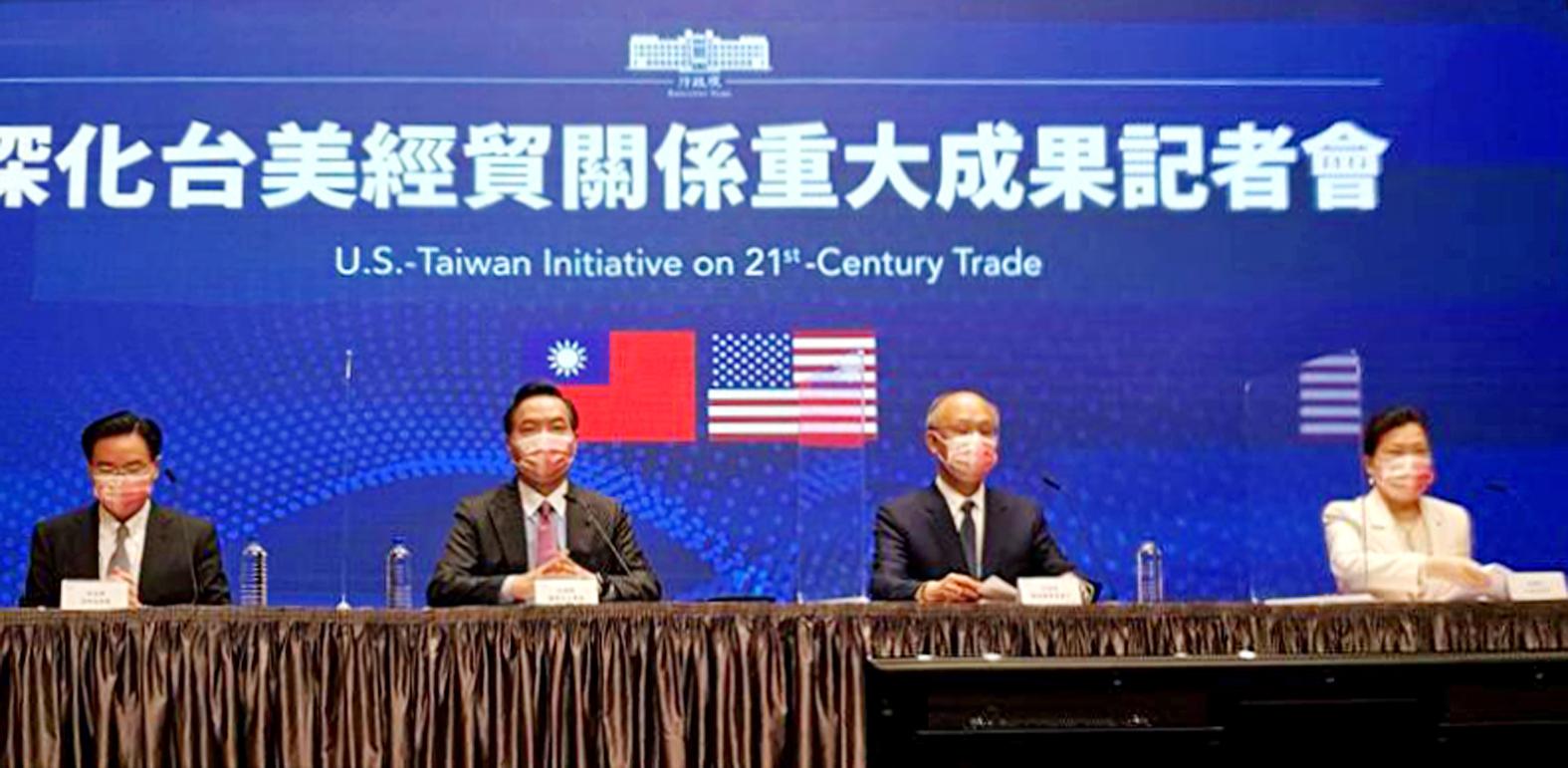Taiwan and the US yesterday announced that they would commence negotiations on a new trade agreement, dubbed the “Taiwan-US Initiative on 21st-century Trade,” signaling a breakthrough after Taiwan was excluded from a US-led regional trade framework.
The first round of negotiations would be held in Washington at the end of this month, Minister Without Portfolio John Deng (鄧振中) told a news conference in Taipei, adding that he would head the Taiwanese delegation to the US.
Deng made the announcement after an online meeting with Deputy US Trade Representative Sarah Bianchi, in which the two sides agreed on the initiative’s name.

Photo: Lee Hsin-fang, Taipei Times
The negotiations would cover 11 areas, but would not include tariffs, Deng said.
The 11 areas include trade facilitation, agricultural trade, fighting corruption, common standards on digital trade, workers’ rights, environmental regulations and state-owned companies, Deng said.
The bilateral initiative largely parallels US President Joe Biden’s Indo-Pacific Economic Framework (IPEF), an economic partnership with 13 Asian countries that he launched last week during a visit to Seoul and Tokyo. Taiwan was not included, although more than 200 members of the US Congress had called for its inclusion.
Deng said that although some of the initiative’s areas would overlap with those in the IPEF, Taiwan would continue working toward joining the regional agreement.
“For many years we have been hoping to launch trade talks with the US, and now the trade talks can officially begin,” Deng said. “This initiative provides us with a mechanism for talks, and Taiwan and the US aim to reach agreements on some topics and sign some agreements in the shortest possible time.”
Meanwhile, the two sides would continue the current Trade and Investment Framework Agreement (TIFA) talks, Deng said, adding that negotiations under the new initiative are intended to lead to the inking of new trade agreements, while TIFA talks focus on solving trade-related disputes.
The talks with Taiwan, led for Washington by the US Trade Representative’s office, would supplement several existing dialogues with Taipei, including one led by the US Department of Commerce on export controls and other supply chain issues, a US official said.
Like the IPEF, the initiative with Taiwan would not need US congressional approval because it would not include market access requirements or reduced tariffs, the official added.
The so-called US “fast track” negotiating authority for major trade agreements expired in July last year, and the Biden administration has not asked the US Congress to renew it.
“We think there’s a lot of robust areas that we can cover, that would really deepen our economic engagement, our economic ties, without dealing with market access issues, but, of course, obviously, we’re not ruling anything out for the future,” the official said.
A second official said the new initiative added to other efforts to “highlight the US commitment to the region, specifically economically.”
The US had lacked an economic pillar to its Indo-Pacific engagement since former US president Donald Trump quit a multinational trans-Pacific trade agreement, in part out of concern over US jobs.

SECURITY: As China is ‘reshaping’ Hong Kong’s population, Taiwan must raise the eligibility threshold for applications from Hong Kongers, Chiu Chui-cheng said When Hong Kong and Macau citizens apply for residency in Taiwan, it would be under a new category that includes a “national security observation period,” Mainland Affairs Council (MAC) Minister Chiu Chui-cheng (邱垂正) said yesterday. President William Lai (賴清德) on March 13 announced 17 strategies to counter China’s aggression toward Taiwan, including incorporating national security considerations into the review process for residency applications from Hong Kong and Macau citizens. The situation in Hong Kong is constantly changing, Chiu said to media yesterday on the sidelines of the Taipei Technology Run hosted by the Taipei Neihu Technology Park Development Association. With

A US Marine Corps regiment equipped with Naval Strike Missiles (NSM) is set to participate in the upcoming Balikatan 25 exercise in the Luzon Strait, marking the system’s first-ever deployment in the Philippines. US and Philippine officials have separately confirmed that the Navy Marine Expeditionary Ship Interdiction System (NMESIS) — the mobile launch platform for the Naval Strike Missile — would take part in the joint exercise. The missiles are being deployed to “a strategic first island chain chokepoint” in the waters between Taiwan proper and the Philippines, US-based Naval News reported. “The Luzon Strait and Bashi Channel represent a critical access

‘FORM OF PROTEST’: The German Institute Taipei said it was ‘shocked’ to see Nazi symbolism used in connection with political aims as it condemned the incident Sung Chien-liang (宋建樑), who led efforts to recall Democratic Progressive Party (DPP) Legislator Lee Kun-cheng (李坤城), was released on bail of NT$80,000 yesterday amid an outcry over a Nazi armband he wore to questioning the night before. Sung arrived at the New Taipei City District Prosecutors’ Office for questioning in a recall petition forgery case on Tuesday night wearing a red armband bearing a swastika, carrying a copy of Adolf Hitler’s Mein Kampf and giving a Nazi salute. Sung left the building at 1:15am without the armband and apparently covering the book with a coat. This is a serious international scandal and Chinese

COUNTERINTELLIGENCE TRAINING: The ministry said 87.5 percent of the apprehended Chinese agents were reported by service members they tried to lure into becoming spies Taiwanese organized crime, illegal money lenders, temples and civic groups are complicit in Beijing’s infiltration of the armed forces, the Ministry of National Defense (MND) said in a report yesterday. Retired service members who had been turned to Beijing’s cause mainly relied on those channels to infiltrate the Taiwanese military, according to the report to be submitted to lawmakers ahead of tomorrow’s hearing on Chinese espionage in the military. Chinese intelligence typically used blackmail, Internet-based communications, bribery or debts to loan sharks to leverage active service personnel to do its bidding, it said. China’s main goals are to collect intelligence, and develop a